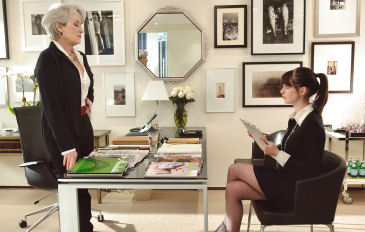Former N.Y. Times fashion columnist Ginia Bellafante , whose writing is delicious and razor-sharp, has given what sounds like a profound stamp of approval to David Frankel‘s The Devil Wears Prada (20th Century Fox, 6.30):

“The fashion beat affords…plenty of time spent in the company of fashion people, something variously dreadful and exhilarating,” Bellafante says early on. “Disciples of the fashion tribe will surely say The Devil Wears Prada exaggerates their manners and proclivities. It doesn’t. The movie is easily the truest portrayal of fashion culture since Unzipped, the 1995 documentary about Isaac Mizrahi.” Having seen it myself, I should add that it barely panders to the alleged longing for formulaic simplicity among its largely female audience. It portrays the fashion world in fairly detailed and unsentimental, grown-up terms. You could argue that when all is said and done the film doesn’t seem to have built up a huge head of emotional steam, but I respect the restraint and the exactitude that went into it. I went right along with Anne Hathaway‘s Andy (whose initial naivete didn’t bother me in the slightest). Stanley Tucci‘s Nigel, a seasoned fixer-facilitator, is dead-on (he should have been given more lines and screen time). And Meryl Streep is chilly perfection as Miranda Priestley, the Anna Wintour-like editor of the fictional fashion mag Runway. Streep seems to have based her performance in part upon Al Pacino’s Michael Corleone in The Godfather, Part II. She barely speaks above a murmur throughout the whole film, the idea being that the truly powerful never need to raise their voice.









